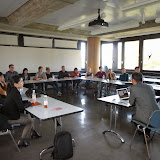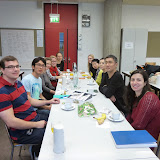メンバーレポート:チューリッヒ大学との研究交流
チューリッヒ大学との研究交流
執筆:祖田 亮次 (大阪市立大学)
2014年10月20~21日に、石川 登、竹内やよい、祖田亮次の3名がスイス・チューリッヒ大学において、本科研プロジェクトに関わる研究発表および研究交流を行った。
チューリッヒ大学ではURPP(University Research Priority Programs)という名称のプログラムのもとで、いくつかの大きな研究プロジェクトが進められている。このプログラムは、チューリッヒ大学が、学内研究者を中心に構成した研究プロジェクトに対して重点的に研究資金を配分するもので、大学全体としては現在 12のプロジェクトが同時進行中である。このURPPプログラムによって推進される研究プロジェクトは、4年ごとに中間評価が行われ、最長3期12年間の継続が可能となっており、本科研よりもはるかに大きな規模の研究プロジェクトが進められている。
チューリッヒ大学のURPPプログラムの1つとして、2013年にスタートした「Global Change and Biodiversity」(Prof. Dr. Michael Schaepmanほか)という研究プロジェクトがある。このプロジェクトでは、寒帯のシベリア、温帯のスイス(ヨーロッパ)、熱帯のボルネオを主要な調査地として、さまざまな調査研究が進められつつあり、自然科学者を中心にプロジェクトを推進しながらも、社会科学とどのように連携するかという点も重視しているという。また、現時点で多様な学問分野から15名の研究員(ポスト・ドクターを中心に博士課程大学院生を含む)を雇用するなど、若手研究者の育成と活用も積極的に行っている。
今回の研究交流は、チューリッヒ大学での研究・滞在経験を持つ竹内やよいがパイプ役となって実現したものであり、ボルネオの環境変化に関する異分野融合的研究をどのように進めるべきか、という点を中心に議論を交わすことになった。具体的なスケジュールは以下の通りである。
(1) 10月20日午前:URPPプログラムおよび「Global Change and Biodiversity」プロジェクトの概要説明と異分野融合プロジェクト推進のための意見交換
(2) 10月20日午後:石川・祖田・竹内による研究発表およびラウンド・テーブル・ディスカッション
(3) 10月21日午前:若手研究者(ポスドク研究員および大学院生)との意見交換(Career Breakfast)
 これらのうち(2)については、以下のようなタイトル・内容で、それぞれが発表した。
● Noboru ISHIKAWA:Human-Nature interactions of the riverine societies in Sarawak, Malaysia
The presentation is about a challenge to conventional anthropocentric perspectives in the social sciences by examining connections and changing relations between nature and non-nature. I will first present an overview of five-year collaborative research (2010–2014) on the human-nature interactions in the riverine societies of Sarawak, Malaysia. A multi-sited, trans-disciplinary research has been conducted in the Kemena and the Tatau catchment basins in Bintulu District, by a team of natural and social scientists in order to examine the emerging dynamics of landscapes of Sarawak with the expansion of planted forest of oil palm and Acacia mangium. The riverine societies connecting inland and coast were strategically chosen to examine the characteristics of human and non-human communities as well as the interactions between the two. I will then elaborate on a long-term objective of realizing holism in social science research both as an anthropologist and a principal investigator. By envisioning a new form of multi-disciplinary area studies of high biomass society in Southeast Asia, the current confluence of geosphere, biosphere and human society under global capitalism can be investigated in a new light.
●Ryoji SODA and Yumi KATO:Thirty years of forest development and the responses of indigenous people in Sarawak, Malaysia
This presentation will begin with outlining the last few decades of forest exploitation and the responses of indigenous people against the movement. Excessive logging, tourism development, the expansion of oil palm plantation, and other economic activities have had both negative and positive impacts on local societies. In the latter half of the presentation I will show socio-cultural adaptation of inland shifting cultivators to recent drastic landscape changes by using case study in Bintulu region, and reconsider the meaning of the research outcome in terms of human-nature interactions which is a main theme of Ishikawa’s project.
●Yayoi TAKEUCHI:Biodiversity reservoirs in a human-modified landscape: Role of remnant forests used by local communities in regional species diversity conservation in Sarawak, Malaysia
Indigenous communities in Sarawak, Malaysia, leave forest patches within the land-use system in an area of shifting cultivation for collecting forest-based materials and/or water catchment. Those forests would have both social and ecological functions. I have conducted field investigations of social background and tree species diversity within those forests. I will present my preliminary results and discuss about the role of those remnant forests in the regional biodiversity conservation.
これらのうち(2)については、以下のようなタイトル・内容で、それぞれが発表した。
● Noboru ISHIKAWA:Human-Nature interactions of the riverine societies in Sarawak, Malaysia
The presentation is about a challenge to conventional anthropocentric perspectives in the social sciences by examining connections and changing relations between nature and non-nature. I will first present an overview of five-year collaborative research (2010–2014) on the human-nature interactions in the riverine societies of Sarawak, Malaysia. A multi-sited, trans-disciplinary research has been conducted in the Kemena and the Tatau catchment basins in Bintulu District, by a team of natural and social scientists in order to examine the emerging dynamics of landscapes of Sarawak with the expansion of planted forest of oil palm and Acacia mangium. The riverine societies connecting inland and coast were strategically chosen to examine the characteristics of human and non-human communities as well as the interactions between the two. I will then elaborate on a long-term objective of realizing holism in social science research both as an anthropologist and a principal investigator. By envisioning a new form of multi-disciplinary area studies of high biomass society in Southeast Asia, the current confluence of geosphere, biosphere and human society under global capitalism can be investigated in a new light.
●Ryoji SODA and Yumi KATO:Thirty years of forest development and the responses of indigenous people in Sarawak, Malaysia
This presentation will begin with outlining the last few decades of forest exploitation and the responses of indigenous people against the movement. Excessive logging, tourism development, the expansion of oil palm plantation, and other economic activities have had both negative and positive impacts on local societies. In the latter half of the presentation I will show socio-cultural adaptation of inland shifting cultivators to recent drastic landscape changes by using case study in Bintulu region, and reconsider the meaning of the research outcome in terms of human-nature interactions which is a main theme of Ishikawa’s project.
●Yayoi TAKEUCHI:Biodiversity reservoirs in a human-modified landscape: Role of remnant forests used by local communities in regional species diversity conservation in Sarawak, Malaysia
Indigenous communities in Sarawak, Malaysia, leave forest patches within the land-use system in an area of shifting cultivation for collecting forest-based materials and/or water catchment. Those forests would have both social and ecological functions. I have conducted field investigations of social background and tree species diversity within those forests. I will present my preliminary results and discuss about the role of those remnant forests in the regional biodiversity conservation.

 (1)~(3)の交流・意見交換においては、何度となく自然科学と社会科学とのコミュニケーションの問題が議論された。とくに(1)の意見交換では、文理融合を進めるための具体的なtipsや、マレーシアでの調査許可取得手続き等についての質問を数多く受けた。本科研プロジェクト推進に関わる工夫と困難を伝える努力をしたが、チューリッヒ大学のプロジェクトは分子生物学から批判地理学までを含む領域が共存しており、また調査地も熱帯から寒帯に至る複数の地域を含んでいるため、これらをどのように連携・統合させていくのかは、我々が経験してきたことよりもさらに大きなチャレンジであると感じた。
一方、若手研究者の研究状況については、日本よりも恵まれた環境が与えられていながらも、フィールドワークを必要とする分野など長期的な視点が不可欠な研究を短期間にどう完結させるのかという点や、プログラム終了後の進路・就職先をいかに確保するかなど、日本と類似した課題も抱えているようで、とくに(3)の意見交換会では、若手研究者が自分たちのキャリア・パスについて様々な不安と困難を抱きながら研究を進めている状況がうかがえた。
残り半年で終了を迎える本科研プロジェクトと、始動し始めたばかりのチューリッヒ大学のプロジェクトとの間で、今後どのような交流や連携ができるのかについては、引き続き模索すべき点であるが、URPPプログラムでは多分野から数多くの研究者がボルネオ研究に関わっているので、プロジェクト単位での連携だけではなく、個々の研究者レベルでの交流促進の必要性・可能性も大きいと思われる。今回の訪問が、そうした研究交流の契機となれば幸いである。
今回の訪問では、URPPのボルネオ・ユニットの中心人物であるMichael Schmidt教授(自然地理学・土壌学)、社会科学との連携を取りまとめるNorman Backhaus教授(人文地理学)、日本人研究者との連絡も担当している清水健太郎教授(進化生態学)、URPPプログラムのOperational ManagerであるVeruska Muccione博士らに大変お世話になりました。また、URPPプログラムの研究員である山崎絵理さん、Ang Cheng Choonさん、Jennifer Bartmessさん、哲学部に留学中の大喜祐太さん(京都大学)ほか、チューリッヒ滞在中の便宜を図っていただいた多くの方々に感謝申し上げます。
(1)~(3)の交流・意見交換においては、何度となく自然科学と社会科学とのコミュニケーションの問題が議論された。とくに(1)の意見交換では、文理融合を進めるための具体的なtipsや、マレーシアでの調査許可取得手続き等についての質問を数多く受けた。本科研プロジェクト推進に関わる工夫と困難を伝える努力をしたが、チューリッヒ大学のプロジェクトは分子生物学から批判地理学までを含む領域が共存しており、また調査地も熱帯から寒帯に至る複数の地域を含んでいるため、これらをどのように連携・統合させていくのかは、我々が経験してきたことよりもさらに大きなチャレンジであると感じた。
一方、若手研究者の研究状況については、日本よりも恵まれた環境が与えられていながらも、フィールドワークを必要とする分野など長期的な視点が不可欠な研究を短期間にどう完結させるのかという点や、プログラム終了後の進路・就職先をいかに確保するかなど、日本と類似した課題も抱えているようで、とくに(3)の意見交換会では、若手研究者が自分たちのキャリア・パスについて様々な不安と困難を抱きながら研究を進めている状況がうかがえた。
残り半年で終了を迎える本科研プロジェクトと、始動し始めたばかりのチューリッヒ大学のプロジェクトとの間で、今後どのような交流や連携ができるのかについては、引き続き模索すべき点であるが、URPPプログラムでは多分野から数多くの研究者がボルネオ研究に関わっているので、プロジェクト単位での連携だけではなく、個々の研究者レベルでの交流促進の必要性・可能性も大きいと思われる。今回の訪問が、そうした研究交流の契機となれば幸いである。
今回の訪問では、URPPのボルネオ・ユニットの中心人物であるMichael Schmidt教授(自然地理学・土壌学)、社会科学との連携を取りまとめるNorman Backhaus教授(人文地理学)、日本人研究者との連絡も担当している清水健太郎教授(進化生態学)、URPPプログラムのOperational ManagerであるVeruska Muccione博士らに大変お世話になりました。また、URPPプログラムの研究員である山崎絵理さん、Ang Cheng Choonさん、Jennifer Bartmessさん、哲学部に留学中の大喜祐太さん(京都大学)ほか、チューリッヒ滞在中の便宜を図っていただいた多くの方々に感謝申し上げます。


(UZH-URPP参照URL) http://www.uzh.ch/research/priorityprograms/university_en.html http://www.gcb.uzh.ch/index.html http://www.gcb.uzh.ch/Events/GCBSeminar.html
チューリッヒ大学メイン・キャンパス
(UZH-URPP参照URL) http://www.uzh.ch/research/priorityprograms/university_en.html http://www.gcb.uzh.ch/index.html http://www.gcb.uzh.ch/Events/GCBSeminar.html

